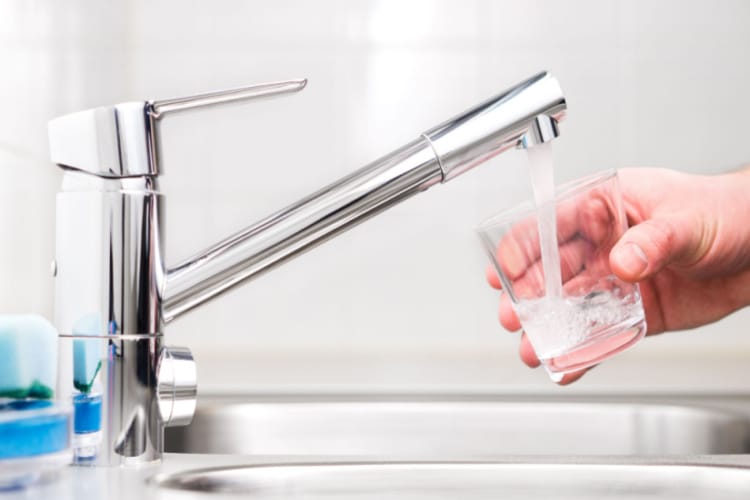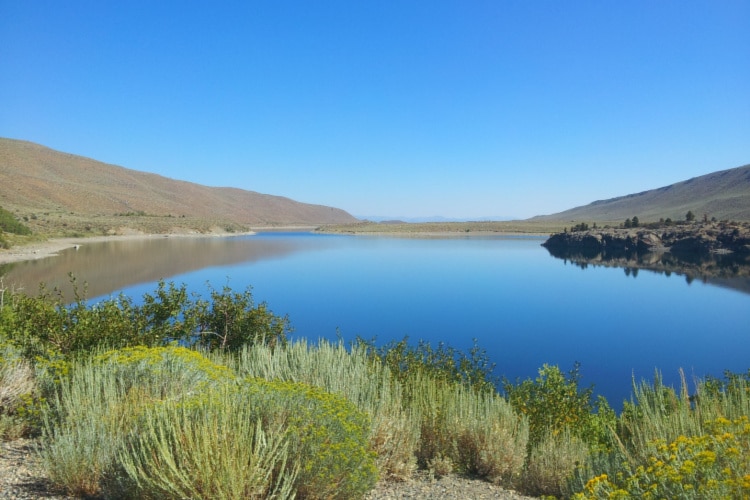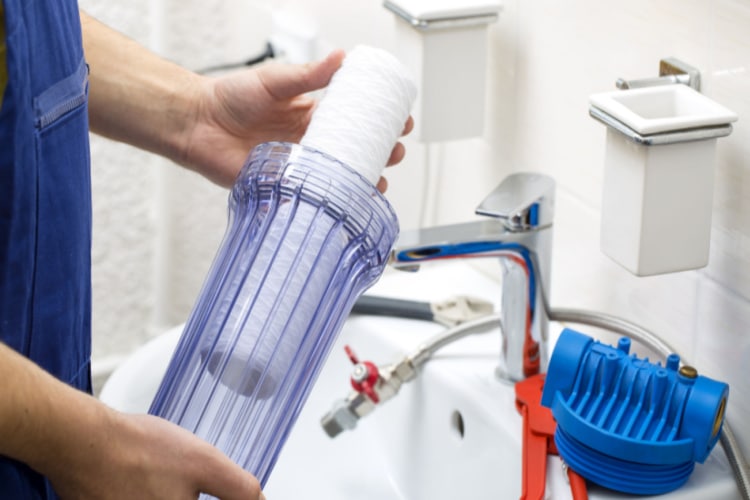If you live in Los Angeles or have ever visited the city, you know that tap water consumption is a contentious subject.
Some residents refuse to drink the water from the tap, even if filtered, preferring to drink only bottled water. Others claim to drink LA tap water every day and feel fine.
So, who is right? Is it safe to drink tap water in Los Angeles?
The short answer is yes — the water is safe according to the Environmental Protection Agency (EPA) guidelines under the National Primary Drinking Water Regulations (NPDWRs). Still, it doesn’t mean that the water in LA is completely free of impurities.

LA Water Quality Report: What is in the Water?
| Contaminant | LA levels | EPA action limit | EPA’s public health goal |
|---|---|---|---|
| Lead | Zero | 15 ppb | Zero |
| Uranium | 1 to 5 ppb | 30 pbb | Zero |
| Fluoride | 0.6 to 0.9 ppm | 2 ppm | 1 ppm |
| Total trihalomethanes | Zero | 80 ppb | Zero |
| Arsenic | 0 to 3.1 ppb | 10 ppb | Zero |
| Hexavalent Chromium | 1 ppb | 100 ppb | 0.02 ppb |
| Bromate | 0.1 to 9.8 ppb | 10 ppb | Zero |
| Total haloacetic acids | Zero | 60 ppb | Zero |
The latest water quality report by the Los Angeles Department of Water and Power shows no contaminant in LA’s water at such high levels that it could threaten the citizens’well-being.
Los Angeles tap water meets the standards set by this government organization. Furthermore, the city doesn’t violate the Safe Drinking Water Act (SDWA) implemented by the EPA.
The EPA regulates 5 carcinogenic contaminants in tap water; arsenic, bromate, chromium 6, radiological contaminants, and TTHMs (trihalomethanes). All these contaminants fall below safety thresholds in LA city water.
That being established, it doesn’t mean the LA water is completely free of these contaminants, as the EPA defines two different standards in the NPDWRs: action level and public health goal. Although some contaminants are below the action level, they don’t meet the public health goal.
Bromate levels in the LA water are even more concerning since they approximate the EPA action level of 10 ppb (with a public health goal of 0). The water has bromate levels varying between 0.1 ppb and 9.8 ppb.
Similarly, uranium’s action level is 30 ppb, while the public health goal regarding this hazardous radiological contaminant 0. The water in LA has uranium levels varying between 1 ppb and 5 ppb.
Lastly, like all municipal authorities in the United States, LA city pumps fluoride into the water to promote teeth health. Although its levels of 0.6 to 0.9 parts per million (ppm) never exceed the action limit (2 ppm) or public health goal (1 ppm), many people prefer to completely remove fluoride from their water by purchasing a fluoride water filter.
Is the Water Hard or Soft?
The average hardness for California water is between 100 and 300 ppm. In Los Angeles, the water hardness rate at 127 ppm (parts per million), which is lower than the state’s hardness scale.
Scientists measure water hardness by the amount of dissolved calcium and magnesium. They measure the hardness in parts per million. If water is very hard, it can cause mineral buildup in pipes and kitchen appliances such as dishwashers and coffee makers.
The hardest water in California is in Ventura, with a water hardness of 472 ppm. The cities with the next-highest water hardness levels are Santa Barbara, at 430 ppm, and Mecca, at 393 ppm.
Where Does LA Get its Water From?

Los Angeles imports most of its drinking water from the Los Angeles Aqueduct system in the Owens Valley and Mono Basin. LA also pumps up some of its groundwater and processes it to remove impurities, but there is not enough water around LA to supply the whole city.
Because Los Angeles is heavily paved and there is very little open space, the small amount of rainwater that falls from the sky does not have a chance to soak into the ground and replenish the groundwater supplies. This is why the city must import much of its water via the aqueducts.
In recent years, Los Angeles has also started using recycled water to replenish its groundwater. Recycled water is water used in sinks, showers, toilets, etc., and is then processed and pumped back into the water system for reuse.
Recycled water is currently only a small part of LA’s water system, but experts anticipate that it will become more important as climate change and drought reduce natural water supplies.
How Tap Water is Treated in LA

LA County uses many different treatment methods to purify groundwater when it does not meet accepted standards. The type of treatment used depends on the quality of the water and the contaminants in it.
Particulates like sand or silt can be removed through filtration, while disinfection through UV light or other processes can kill dangerous bacteria or viruses. “Blending,” which is a process that involves mixing water from various sources, can also reduce the contaminant levels.
People concerned about the levels of minerals and other particulates in their water can use carbon filters to remove asbestos, cysts, lead, certain pesticides, trihalomethanes, and volatile organic compounds (VOCs).
Carbon filters add healthy minerals back into water after filtration. For example, charcoal adds minerals like calcium, magnesium, and iron, which often gets stripped out of processed LA tap water.
Do They Have the Cleanest Tap Water?
Los Angeles does not have the cleanest tap water in the world or the United States. The tap water in LA contains about 4 times as many contaminants and chemicals as the average large US city.
Memphis, Tennessee, is known for having the purest, sweetest tap water in the world. Memphis water contains very low levels of minerals and contaminants, so the water does not need to be treated after it comes out of the ground.
Contrary to what some people believe, untreated water that contains few minerals tastes better than treated water.
Conclusion
In summary, LA tap water is legally safe to drink. However, the legal levels set by the EPA aren’t equal to the same agency’s public health goals. Meeting these goals is left to the citizens.
If you live in LA or are visiting the city and are concerned about the water quality, we recommend you invest in a high-quality water filter.
Thanks Scott for the provided info. I really find it so inforamtive for me, that made me want to seek your opinion.
I moved from Montreal, Canada to LA recently and that water is really challenging here for me and my kids.
I used the tap water at the begining (out of habit from back home) but it was not the best idea, so I turned to purified water for drinking and cooking, yet I am wondering is it the best that I can do here in southern Cali or do I have other better alternatives?
Thanks for your feedback and kind advice!
Hi Chris, there are good purified water choices available in SoCal with one of my favorites being the Crystal Geyser brand. Their sources are direct from either Mount Shasta in far Northern California or Olancha Peak at the southern end of the Sierra. Of course, there are always pros & cons to which path you take. Buying water constantly is not convenient and may prove to be more expensive than if you had your water conditioned/filtered appropriate for your residence. You can see on our site we talk about a variety of water systems, whether they’re point-of-use like an under the sink or countertop system. Or, you can go with a whole-house system. There are different considerations for what system may suit your needs best and you can read some of our content where we discuss exactly these points. Another point is if you’re renting or own your own home. These personal factors all make a difference on the best way to approach this situation. If it makes sense for your personal requirements, then a whole-house system from someone like SpringWell (which we review very favorably and our readers love) could be an excellent option. Check out our reviews and content and see what is best for you.